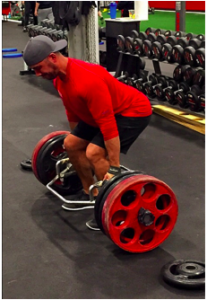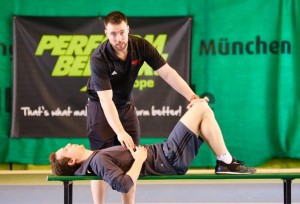Is Your Grip Strength More Important Than Your Blood Pressure?
“Stronger People Are Harder To Kill and More Useful In General.”
– Mark Rippetoe
A number of studies have come out recently showing that grip strength is a dependable predictor of overall health and wellness. This is likely no surprise to long-time advocates of the iron but it signifies a big step in the right direction for the traditional medical community.
Studies have associated grip strength with:
- Reduced Cardiovascular Risk: Hand Grip Strength Significantly Predicts Cardiovascular Event Risk in Patients With Type 2 Diabetes.¹
- Reduced Complications From Surgery: Hand-grip strength is a simple and effective outcome predictor in esophageal cancer following esophagectomy with reconstruction: a prospective study.²
- Reduced Length Of Hospital Stay: Is grip strength associated with length of stay in hospitalized older patients admitted for rehabilitation? Findings from the Southampton grip strength study.³
- All-Cause Mortality: Grip strength predicts cause-specific mortality in middle-aged and elderly persons.4
Consider this stunning statistic from The PURE Study that tracked over 150,000 subjects over 17 different countries.5
“Each 11-pound decrease in grip strength over the course of the study was linked to a 16% higher risk of dying from any cause, a 17% higher risk of dying from heart disease, a 9% higher risk of stroke, and a 7% higher risk of heart attack.”
That’s pretty damn convincing. What’s even more shocking is that the study concluded:
“Grip strength was a stronger predictor of all-cause and cardiovascular mortality than systolic blood pressure.”
Whoa, talk about rocking the boat! Blood pressure has been the most frequently utilized measure of CVD risk for over 100 years. Maybe next time you visit the Doc they should be pulling out the dynamometer instead of the sphygmomanometer!
Now it’s important to recognize something here.
It’s not the grip itself that is the proposed mechanism for improving health outcomes. Grip strength is a signifier of overall vitality and robustness. I think you would be misguided to go out and buy the Captains Of Crush grip trainer in an effort improve your health. (Although I think these are freaking awesome and I believe they have utility elsewhere.)
People who lift weights are generally healthier overall and make better lifestyle choices than those who do not. A natural side effect of participating in weight lifting is an increase in grip strength especially with exercises like chin-ups, deadlifts and carries. Additionally, we know that graded, progressive exercise builds stronger and more resilient humans especially as we age.
A study looking at the effect of strength training and aerobic exercise on inflammatory gene expression in elderly populations demonstrated that key inflammatory biomarkers IL-6, TLR4 and TNF-alpha all dropped significantly in response to exercise intervention.6
So if strength training is the medicine, what is the prescription?
Trade in machine-based training and “toning” routines for free weights. The key to developing resiliency through weight training is to lift weights that are progressively challenging and to choose exercises that require you to stabilize your torso against a load.
Goblet Squats, Deadlifts, Split Squats, Push-Ups, Rows and Carries are a great place to start.
If you are new to the weight room hire a coach in your area who is an expert or look into online training with a qualified professional. You wouldn’t take a prescription medication without advisement from your doctor would you?
At MBSC we offer group and personal training as well as online programming for clients who cannot work with us in person.
Strength training is simple but not easy and physical vitality is built with good old fashion hard work and heavy lifting. Next time you hit the gym pick up something heavy and put it back down then carry it and squat it, you might just live longer.
1). Rein, Philipp, et al. “Hand Grip Strength Significantly Predicts Cardiovascular Event Risk in Patients With Type 2 Diabetes.” Circulation 132.Suppl 3 (2015): A14063-A14063.
2). Chen C-H, Ho-Chang, Huang Y-Z, Hung T-T. Hand-grip strength is a simple and effective outcome predictor in esophageal cancer following esophagectomy with reconstruction: a prospective study. Journal of Cardiothoracic Surgery. 2011;6:98. doi:10.1186/1749-8090-6-98.
3). Kerr, A., et al. “Does admission grip strength predict length of stay in hospitalised older patients?.” Age and ageing 35.1 (2006): 82-84.
4). Sasaki, Hideo, et al. “Grip strength predicts cause-specific mortality in middle-aged and elderly persons.” The American journal of medicine 120.4 (2007): 337-342.
5). Leong DP, Teo KT, Rangarajan S, et al. Prognostic value of grip strength: Findings from the Prospective Urban Rural Epidemiology (PURE) study.Lancet 2015; DOI:10.1016/S0140-6736(14)62000-6.
6). Lambert, Charles P., et al. “Exercise but not diet-induced weight loss decreases skeletal muscle inflammatory gene expression in frail obese elderly persons.” Journal of Applied Physiology 105.2 (2008): 473-478.

